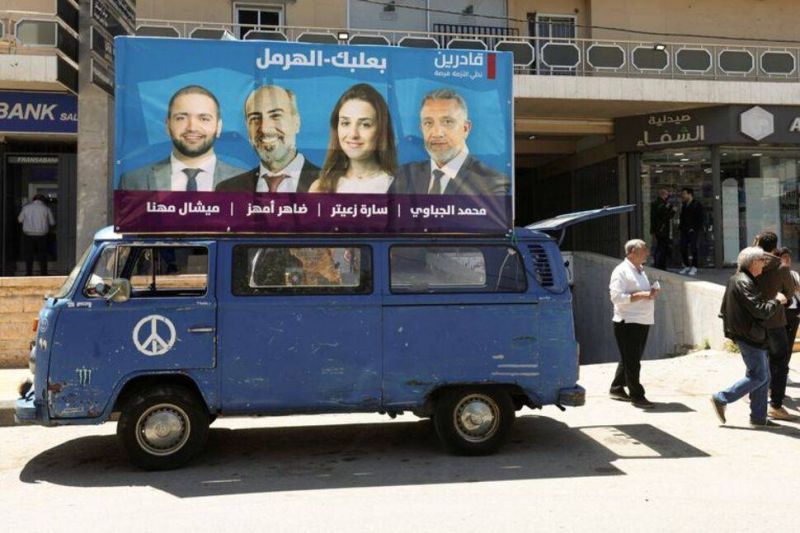
A mobile billboard for Sara Zaiter, a French professor who ran as an opposition candidate in Lebanon’s 2022 elections, and members of her list, in Baalbeck, May 8, 2022. (Credit: Reuters/Aziz Taher)
The 13 uprising parliamentarians potentially have three working allies who were elected to represent the South Lebanon I district (Sidon and Jezzine) — Osama Saad, Abdel Rahman Bizri, and Charbel Massaad. Those three deputies were on the streets during the “October 17” uprising and have an anti-system agenda, unlike other independent deputies, such as Michel Moawad and Neemet Frem who have primarily an anti-Hezbollah platform and an agenda of limited reforms of the system. If they manage to forge some sort of alliance, they will have a parliamentary bloc of 16 that is nearly equal to each of the main traditional parties, but they are limited in their coalition potentials and in their ability to pass draft laws unless they cooperate with the ruling class they have long loathed. Uprising candidates have won seats in both urban and rural areas and in all five provinces (five seats in Beirut, three in Mount Lebanon, two in each south and north Lebanon, and one in Bekaa), which represents seven Muslim and six Christian seats. If we count the actual votes, the uprising candidates got 203,857 votes out of 1,861,203 cast, which means around 11 percent of the vote. This is reflected in having 13 seats or 10 percent of 128 seats in Parliament.
Limited inroads
There are different ways to explain the reasons behind the limited inroads made by uprising candidates. They had no centralized leadership running the election nationwide and they put forward competing electoral lists in key districts, which may have cost them some seats in key districts, such as Baabda. In some cases it is not clear whether there were unique circumstances that led to their election or if voters will elect them again in 2026. Ibrahim Mneimneh, Melhem Khalaf, and Waddah Sadek were elected in Beirut II primarily because former Prime Minister Saad Hariri did not run and probably because some Future Movement votes might have gone to them. For instance, while the context is different, Mneimneh received 2,747 when he ran against the Future Movement in the 2016 municipal elections, while he gained 13,281 votes in the latest polls without the participation of the Future Movement. Moreover, if we look at the minutes of the eleventh elementary registration committee in Beirut II district, a stronghold of the Future Movement, Saad Hariri received 1,485 votes in the 2018 general election, while Mneimneh took only 144 votes, compared to 1,203 votes in the 2022 elections.
Moreover, the three seats gained in the Aley district might also be an exception partially linked to the calculations of Druze leader Walid Joumblatt. The PSP head typically keeps this candidate spot vacant for his traditional competitor Talal Arslan, but uprising candidate Marc Daou snatched this seat with 11,656 votes. While Arslan performed better receiving 9,008 votes in 2022 compared to 7,887 votes in 2018, the votes for the Progressive Socialist Party’s leading candidate, Akram Chehayeb, dropped from 14,088 votes in 2022 to 11,373 votes in 2018. Some of these votes might have reinforced the victory of Marc Daou.
Some of the uprising candidates have won their seats thanks to the electoral law they criticized, despite earning a low number of votes — such as Cynthia Zarazeer in Beirut (486 votes) and Michel Douaihy in north Lebanon (1,768 votes). These two are unlikely to be elected under a different electoral law and their win might not be repeated in 2026. By contrast, uprising candidates who received competitive votes such as Jad Ghosn (8,526 votes) in Metn and Michel Helou (5,483 votes) in Baabda did not win their seats. Uprising candidates did not perform well electorally in South Lebanon I and II (Hezbollah-Amal stronghold areas) nor in Kesrouan-Jbeil, where traditional Christian and independent candidates compete, nor in the Bekaa.
Challenge coming
This election has also shown that uprising candidates have much to learn in how to run a centralized campaign, how to create an effective electoral organization, how to communicate and convey messages to voters, and how to conduct retail politics especially in rural areas. The winning candidates even failed to organize a gathering to celebrate their victory, instead letting the honor fall to “Sar al-Wa't,” an MTV show that’s long promoted the traditional political class. What they say, how they say it, and where they say it will matter in Lebanese politics moving forward. Uprising candidates should learn from their mistakes in their first election and begin preparing for the 2026 election by pushing for a new electoral law, unifying their ranks and building their campaign structure. They have much to do, an accumulative process rather than a revolutionary one.
The uprising candidates have now been officially integrated in the system, not as a unified political group but as dispersed candidates. To survive, the challenge is to change the perception of their disunity during the campaign and attempt to form a parliamentary bloc that has minimal coherence. They will be scrutinized more than others because they are the new kids on the block, but if effectively explored, they have a unique opportunity to become a long-term force in Lebanese politics — an opportunity that might arise again. Otherwise, their participation in this election might merely re-legitimize a failed system looking for aid from the international community.
Joe Macaron is a Middle East analyst and a PhD candidate at the University of Bath.